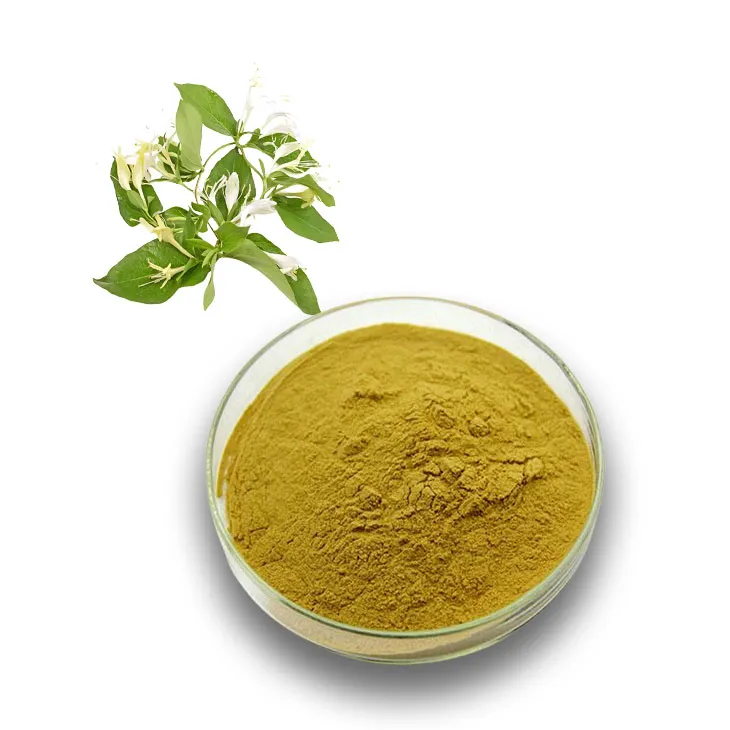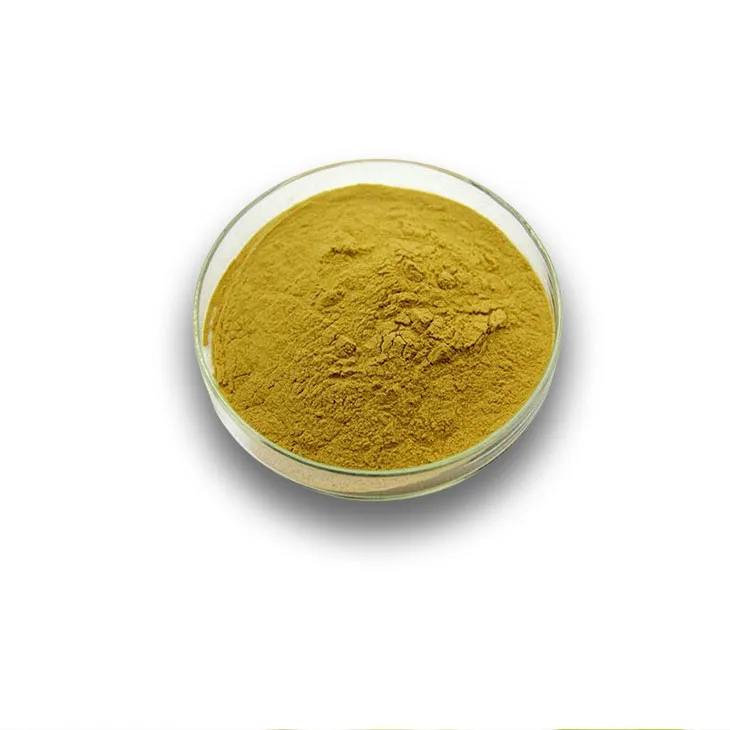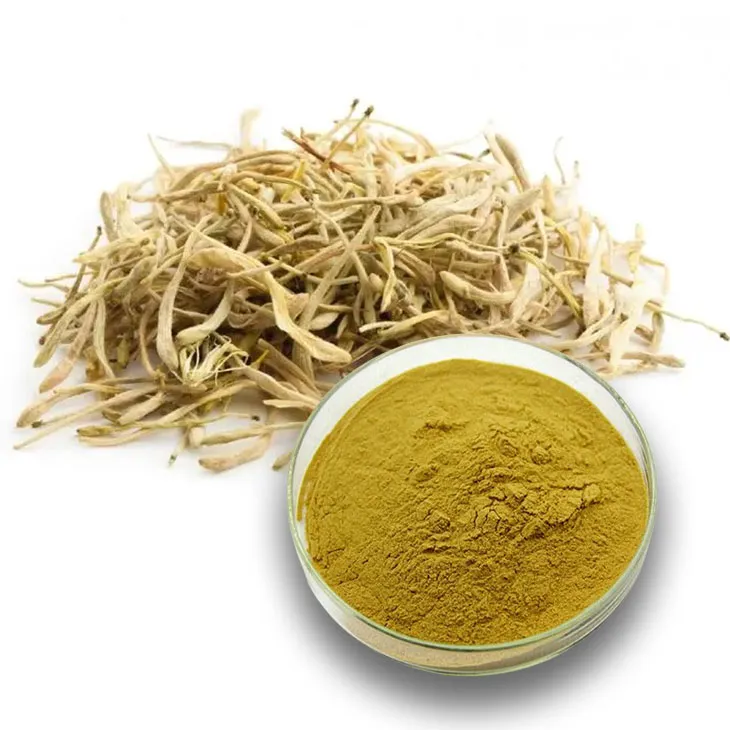- 0086-571-85302990
- sales@greenskybio.com
14 Major Health - care Effects of Honeysuckle Pollen.
2024-11-13

1. Introduction
Honeysuckle Pollen has been recognized for its various health - care properties in traditional medicine. It is a natural product that contains a rich variety of bioactive compounds. These compounds contribute to its multiple functions in promoting human health. In this article, we will explore the 14 major health - care effects of Honeysuckle Pollen in detail.

2. Anti - oxidant Effects
Oxidative stress is a major factor contributing to various diseases and aging processes in the human body. Honeysuckle Pollen contains powerful antioxidants such as flavonoids and phenolic compounds.
These antioxidants work by scavenging free radicals. Free radicals are unstable molecules that can damage cells, DNA, and proteins. By neutralizing these free radicals, honeysuckle pollen helps to protect the body's cells from oxidative damage.
Regular consumption of honeysuckle pollen may contribute to a reduction in the risk of chronic diseases associated with oxidative stress, such as heart disease, cancer, and neurodegenerative disorders.

3. Anti - bacterial Properties
Honeysuckle pollen has demonstrated significant antibacterial activity. It contains certain substances that can inhibit the growth and reproduction of bacteria.
For example, some of the bioactive compounds in honeysuckle pollen can disrupt the cell walls or membranes of bacteria. This interference with the bacterial structure makes it difficult for the bacteria to survive and multiply.
- It can be effective against common pathogenic bacteria such as Staphylococcus aureus and Escherichia coli.
- Using honeysuckle pollen - based products may help in preventing and treating bacterial infections, especially in cases where antibiotic resistance is a concern.

4. Immune - enhancing Function
The immune system is crucial for protecting the body from diseases. Honeysuckle pollen can play an important role in enhancing the immune system.
It contains nutrients and bioactive substances that stimulate the production and activity of immune cells, such as lymphocytes and macrophages.
- These immune cells are responsible for recognizing and eliminating foreign invaders, including viruses, bacteria, and other pathogens.
- By strengthening the immune system, honeysuckle pollen can help the body to better resist infections and diseases, and may also contribute to a faster recovery from illness.

5. Heat - clearing and Detoxifying
In traditional medicine, honeysuckle is often associated with the functions of heat - clearing and detoxifying. Honeysuckle pollen also inherits these properties.
When the body is exposed to external heat - causing factors or accumulates toxins, honeysuckle pollen can help to clear the heat and remove toxins.
- It may help to relieve symptoms such as fever, sore throat, and skin rashes that are often associated with excessive heat or toxin accumulation in the body.
- By promoting the elimination of toxins from the body, it can also improve the overall function of internal organs.
6. Anti - inflammatory Effects
Chronic inflammation is linked to many health problems, including arthritis, heart disease, and certain cancers. Honeysuckle pollen has anti - inflammatory properties.
The bioactive compounds in it can inhibit the production of inflammatory mediators, such as cytokines and prostaglandins.
- By reducing inflammation, honeysuckle pollen may help to alleviate pain and discomfort associated with inflammatory conditions.
- It can also contribute to the prevention of chronic inflammatory diseases by suppressing the underlying inflammatory processes.
7. Cardiovascular Protection
Honeysuckle pollen offers several benefits for cardiovascular health.
Its antioxidant properties help to prevent the oxidation of low - density lipoprotein (LDL) cholesterol. Oxidized LDL is a major contributor to the formation of atherosclerotic plaques in the arteries.
- By reducing LDL oxidation, honeysuckle pollen can lower the risk of developing atherosclerosis, which is a leading cause of heart attacks and strokes.
- It may also have a positive effect on blood pressure regulation, helping to keep blood pressure within a normal range.
8. Respiratory Health
Honeysuckle pollen can be beneficial for respiratory health.
It has anti - bacterial and anti - inflammatory properties that can help to combat respiratory infections, such as bronchitis and pneumonia.
- For those with respiratory allergies, honeysuckle pollen may also help to reduce the symptoms of allergic reactions in the respiratory tract, such as sneezing, coughing, and shortness of breath.
- It can also help to soothe irritated respiratory tissues, promoting better breathing function.
9. Digestive System Support
Honeysuckle pollen can support the health of the digestive system.
It contains dietary fiber which can promote regular bowel movements and prevent constipation.
- The antibacterial properties of honeysuckle pollen can also help to maintain a healthy balance of gut microbiota. A healthy gut microbiota is essential for proper digestion, nutrient absorption, and immune function.
- It may also help to relieve digestive discomforts such as indigestion and abdominal pain.
10. Anti - aging Effects
As mentioned earlier, the antioxidant properties of honeysuckle pollen play a significant role in its anti - aging effects.
By protecting cells from oxidative damage, it can slow down the aging process at the cellular level.
- It can also help to maintain the elasticity and firmness of the skin by promoting collagen production. Collagen is an important protein for skin health, and its decline is associated with the appearance of wrinkles and sagging skin.
- Overall, regular consumption of honeysuckle pollen may contribute to a more youthful appearance and better overall health as one ages.
11. Liver Protection
The liver is an important organ for detoxification and metabolism in the body. Honeysuckle pollen can offer protection to the liver.
Its antioxidant and detoxifying properties help to prevent liver damage caused by toxins, drugs, and oxidative stress.
- It may also promote liver cell regeneration, which is crucial for maintaining the normal function of the liver.
- By protecting the liver, honeysuckle pollen can contribute to overall health and well - being, as the liver plays a central role in many physiological processes.
12. Anti - diabetic Effects
There is evidence to suggest that honeysuckle pollen may have anti - diabetic effects.
Some of its bioactive compounds may help to regulate blood sugar levels. They can either improve insulin sensitivity or stimulate the secretion of insulin, depending on the specific mechanism.
- For diabetic patients, consuming honeysuckle pollen may assist in better blood sugar control, reducing the risk of complications associated with diabetes, such as nerve damage, kidney disease, and eye problems.
- However, it should be noted that it cannot replace medical treatment for diabetes, but can be used as a complementary approach.
13. Kidney Support
Honeysuckle pollen can also support the function of the kidneys.
It has a diuretic effect, which means it can increase urine production. This helps to remove waste products and excess water from the body through the urinary system.
- By promoting the excretion of toxins and waste, it can relieve the burden on the kidneys and support their normal function.
14. Stress Relief and Mental Well - being
Honeysuckle pollen may have a positive impact on stress relief and mental well - being.
Although the exact mechanisms are not fully understood, some of its bioactive compounds may have a calming effect on the nervous system.
- Reducing stress can have a wide range of benefits for overall health, including improved sleep quality, better mood, and enhanced cognitive function.
- By promoting mental well - being, honeysuckle pollen can contribute to a more balanced and healthy lifestyle.
15. Conclusion
Honeysuckle pollen has a wide range of health - care effects, covering various aspects of the human body from physical health to mental well - being. With its 14 major health - care functions, it has the potential to be used as a natural supplement for promoting health and preventing diseases. However, more research is still needed to fully understand its mechanisms of action and to ensure its safety and efficacy in different populations.
FAQ:
What are the antioxidant effects of honeysuckle pollen?
Honeysuckle pollen contains various bioactive substances that can scavenge free radicals in the body. Free radicals are unstable molecules that can cause oxidative damage to cells, leading to aging and various diseases. The antioxidant components in honeysuckle pollen help neutralize these free radicals, thereby protecting cells from oxidative stress and maintaining their normal function.
How does honeysuckle pollen enhance the immune system?
Honeysuckle pollen may contain nutrients and bioactive compounds that stimulate the immune system. It can promote the production and activity of immune cells such as white blood cells. These immune cells play a crucial role in defending the body against pathogens, including bacteria, viruses, and fungi. By enhancing the immune system, honeysuckle pollen helps the body better resist infections and diseases.
What are the antibacterial mechanisms of honeysuckle pollen?
Honeysuckle pollen likely contains certain antibacterial substances. These substances may interfere with the normal physiological functions of bacteria. For example, they could disrupt the bacterial cell wall synthesis, affect bacterial protein synthesis, or interfere with the bacterial metabolism. As a result, the growth and reproduction of bacteria are inhibited, reducing the risk of bacterial infections in the body.
Can honeysuckle pollen really clear heat and detoxify?
Yes, honeysuckle pollen has the property of clearing heat and detoxifying. In traditional medicine concepts, heat" and "toxins" are often associated with inflammation and the presence of harmful substances in the body. Honeysuckle pollen may help reduce inflammation and promote the elimination of toxins from the body through its bioactive components. This can be beneficial for improving some symptoms related to internal "heat" and toxicity, such as skin problems or digestive disorders.
How does honeysuckle pollen regulate the body's internal environment?
Honeysuckle pollen contains a variety of nutrients and bioactive substances. These components can interact with the body's physiological systems. For example, it may help balance the body's hormonal levels, adjust the pH of body fluids, and improve the function of the digestive and excretory systems. By influencing these aspects, honeysuckle pollen contributes to the regulation of the body's internal environment, ensuring that various physiological processes occur smoothly.
Related literature
- "The Health Benefits of Honeysuckle Pollen: A Comprehensive Review"
- "Antioxidant and Immune - enhancing Properties of Honeysuckle Pollen"
- "Honeysuckle Pollen: Mechanisms of Antibacterial and Detoxifying Effects"
- ▶ Hesperidin
- ▶ citrus bioflavonoids
- ▶ plant extract
- ▶ lycopene
- ▶ Diosmin
- ▶ Grape seed extract
- ▶ Sea buckthorn Juice Powder
- ▶ Beetroot powder
- ▶ Hops Extract
- ▶ Artichoke Extract
- ▶ Reishi mushroom extract
- ▶ Astaxanthin
- ▶ Green Tea Extract
- ▶ Curcumin Extract
- ▶ Horse Chestnut Extract
- ▶ Other Problems
- ▶ Boswellia Serrata Extract
- ▶ Resveratrol Extract
- ▶ Marigold Extract
- ▶ Grape Leaf Extract
- ▶ blog3
-
Cranberry Plants and Skin - care Products.
2024-11-13
-
Rose Hip Extract
2024-11-13
-
Milk Thistle Extract
2024-11-13
-
Lily extract
2024-11-13
-
Natural grape seed extract
2024-11-13
-
Feverfew Extract
2024-11-13
-
Lemon Extract
2024-11-13
-
Chaste Berry Extract
2024-11-13
-
Red Vine Extract
2024-11-13
-
Hawthorn Extract
2024-11-13
-
Longan Extract
2024-11-13





















